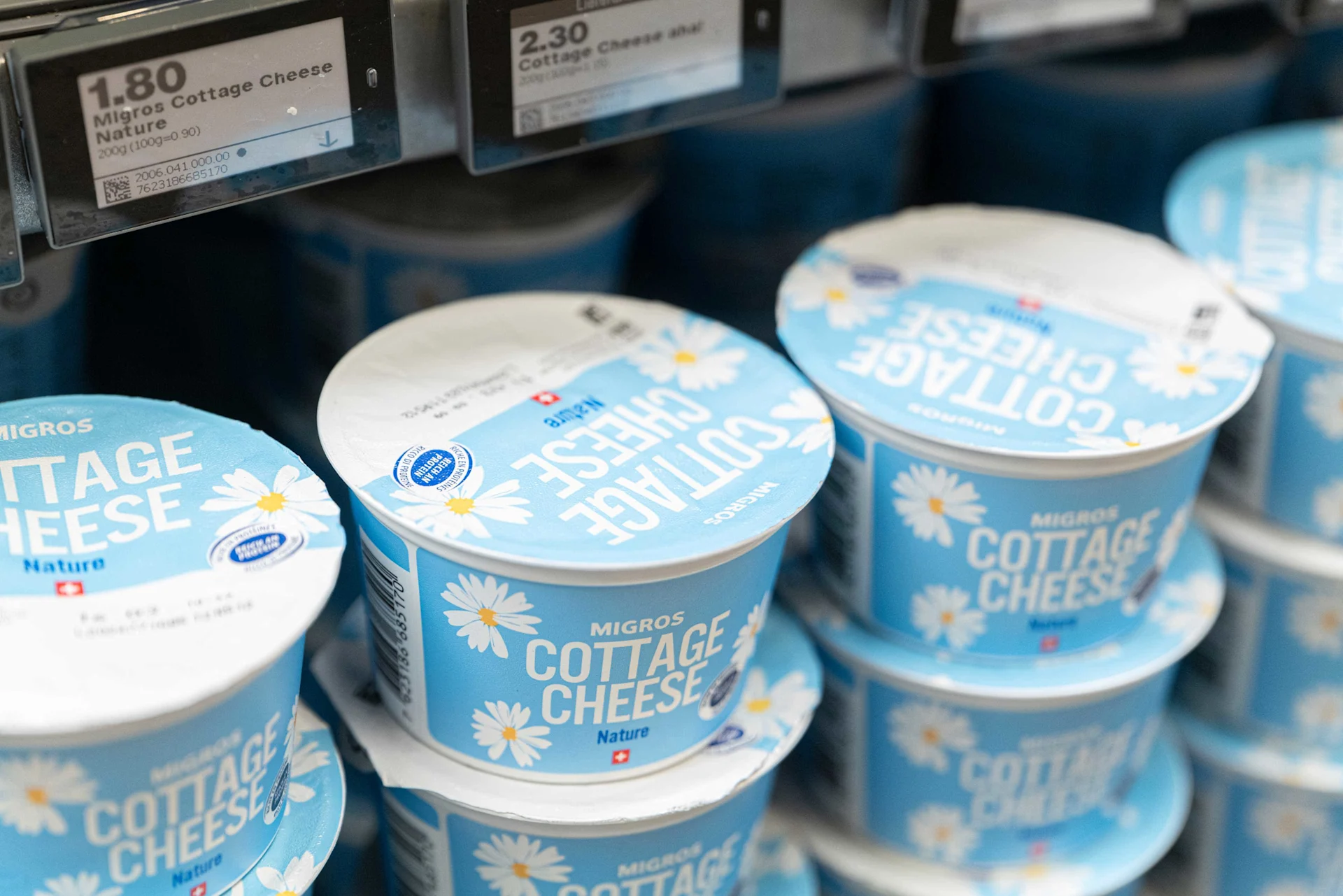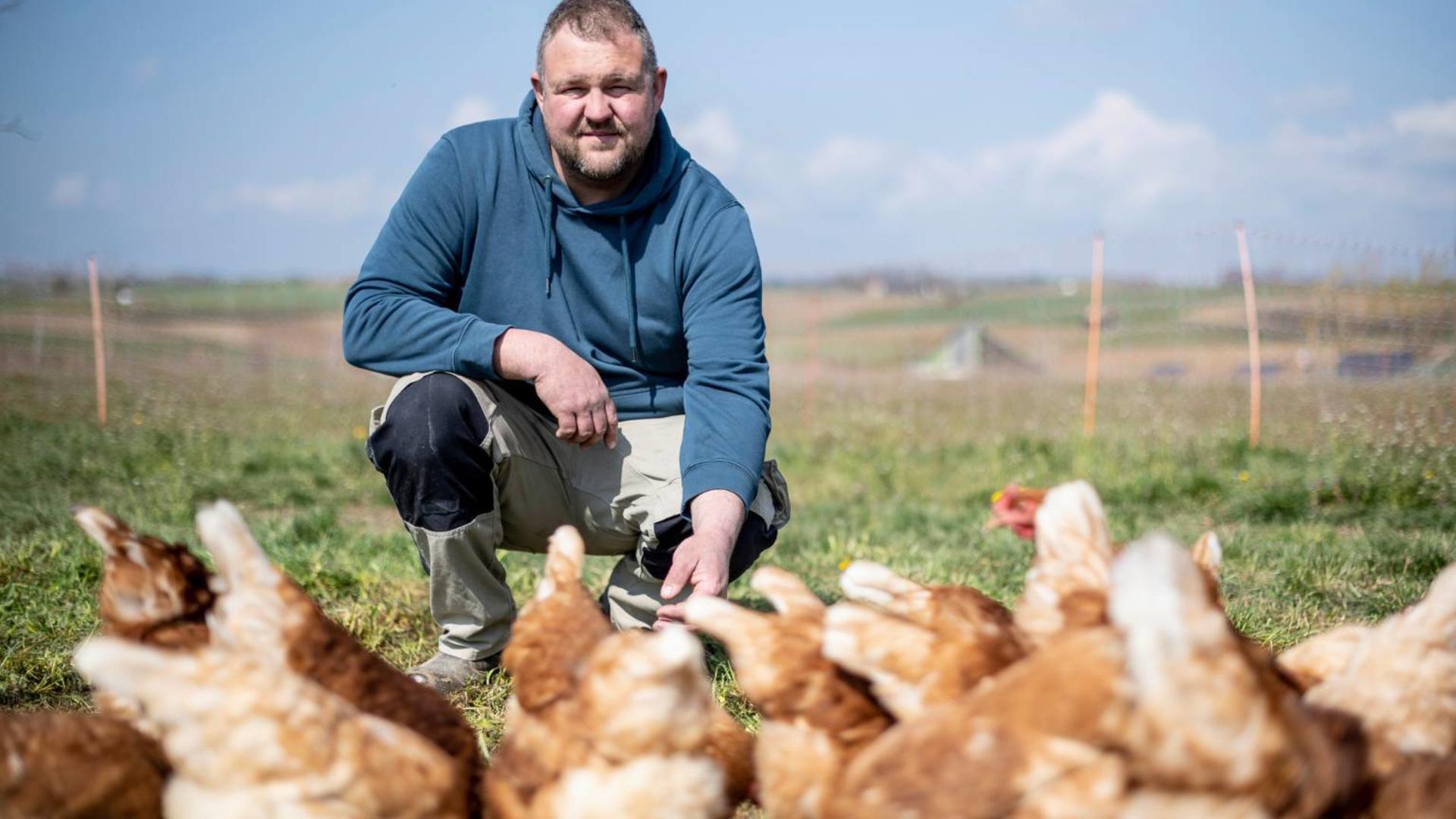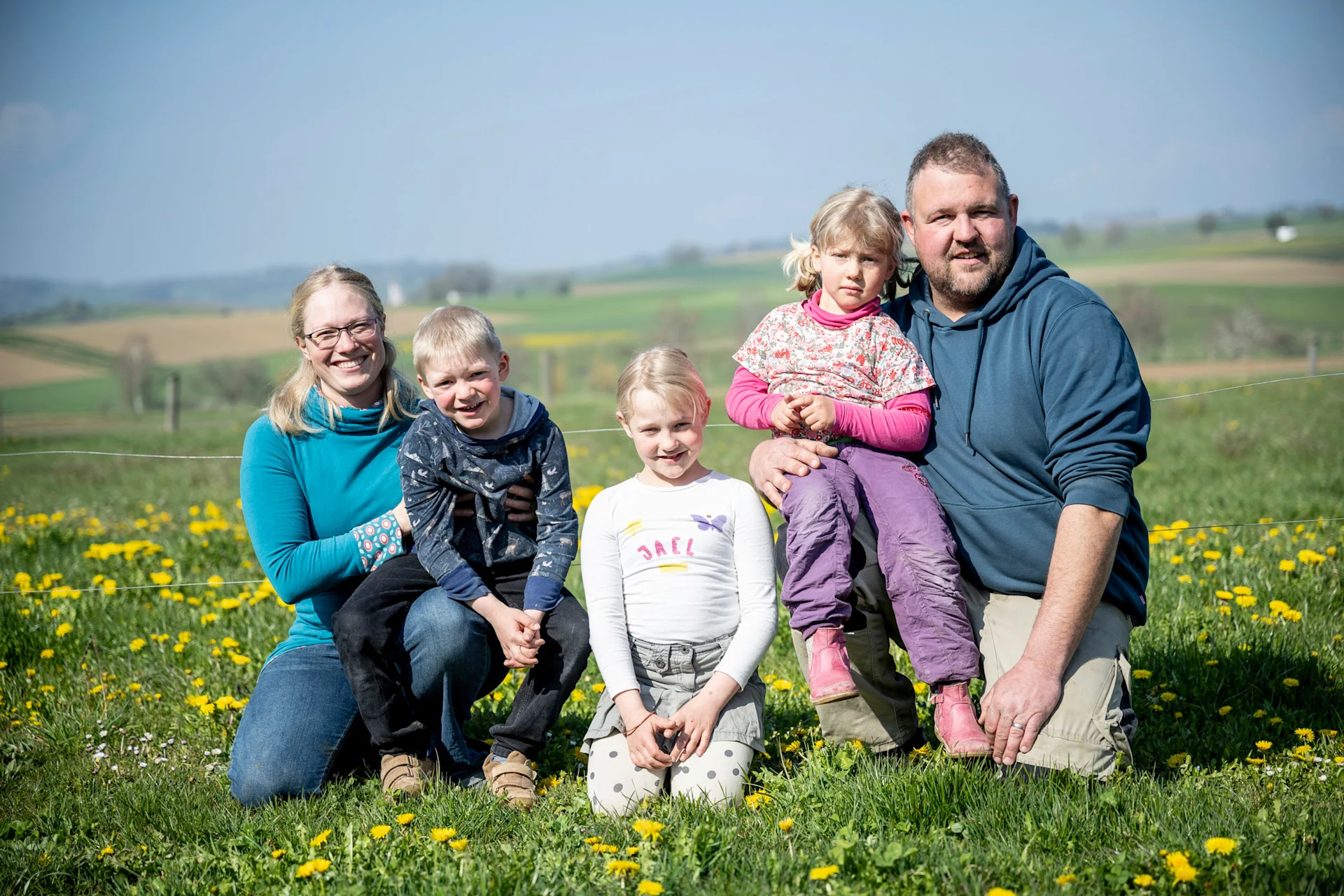
Responsible packaging
Migros is doing all it can to make packaging more sustainable and eco-friendly.
navigation

Animal welfare
In Klettgau, Anno and Margrith Lutke Schipholt manage their farm according to Demeter guidelines. What do Demeter farmers do that conventional farmers don’t? A visit to northern Switzerland.
The sun rises over the Randen mountains. Anno Lutke Schipholt (35) squints and cannot stifle a yawn. On this sunny morning, he for once didn’t just get up with the chickens, but even before all the scratching and clucking in the pasture began.
The Demeter farmer keeps a total of 800 laying hens in three mobile chicken coops on the «Hof am Stei» farm in Siblingen, canton of Schaffhausen. Once a week, he moves the coops before the chickens go out. This is the case today. «That’s necessary so that grass and herbs can start growing again under the coop,» explains Lutke Schipholt. In addition, repositioning also helps to keep pathogens away from the chickens.
A conveyor belt transports chicken manure into the tractor’s large bucket. Lutke Schipholt drives to the compost heap with the full bucket. And returns with chicken feed. From the pallet fork of the tractor, he empties 30-kilo bags of a cereal and grain mixture into a hopper. The way the farmer handles the bags at a height of two metres is a balancing act. The feed enters the mobile coop via the hopper. There, a computer-controlled system takes over the details of its distribution. The system obtains the necessary electricity from solar panels mounted on the roof of the coop. «That’s certainly convenient – in the other two coops I have to carry the feed bags into the coop,» explains the farmer. Lutke Schipholt will also collect the eggs by hand around evening, after opening the flaps to the laying areas at the back of the coop.
But now the farmer opens the coop door and the chickens flock outside. The 300 chickens in the largest coop have half a hectare of meadow at their disposal for scratching and pecking. Some rush off, others stay together in smaller and larger groups. Roosters, too, are crowing and strutting about.
«In organic agriculture, the soil is the central element»
In Lutke Schipholt’s flock of chickens, there is one rooster for every 50 hens. And what happens to the rest? Or doesn’t the Demeter scheme «Hahn im Glück» («Happy Roosters») promise that equal numbers of hens and roosters are kept so as to avoid killing the male chicks? «They’re raised on another farm,» farmer Lutke Schipholt clarifies. «We work with a partner farm that fattens young roosters.» He also works with other farmers, for example those who can make good use of chicken manure. In return, Lutke Schipholt gets feed grain. This enables the farms to achieve a healthy circular economy in which a large part of the feed has to come from their own cultivation and manure and slurry are also used.
While the chickens are scratching, Anno Lutke Schipholt pauses briefly and looks at the ground. «In organic agriculture, the soil is the central element,» he says. The Demeter philosophy also includes pesticide-free fields. The farmer counteracts tread damage on the pasture with careful loosening and sowing of meadow herbs. Here, deadnettles, shepherd’s purse and speedwell blossom. The cattle and later the chickens also like this. «You should feed the soil with its microorganisms in the same way as you would feed a herd of dairy cows,» the farmer explains the principle.
However, «feeding» the soil goes far beyond fertilising it with compost. Anno Lutke Schipholt uses home-made preparations for this purpose, which is typical of all Demeter farmers. The best-known example is horn manure. This involves burying a cow horn with cow dung for several months. The fermented manure is then used to create a spray to strengthen and increase soil fertility. For many, this sounds like agricultural esotericism at first. «This is knowledge that many more people used to have. And they applied it because it works,» he explains calmly. Recently, there has even been a scientific study on horn manure. «Put simply, fermentation in the horn creates something similar to a probiotic drink – only for the soil. This improves the soil structure, soil fertility and promotes humus formation,» says Lutke Schipholt.
«Put simply, fermentation in the horn creates something similar to a probiotic drink – only for the soil.»
But are organic preparations sufficient when plant diseases or pests strike? For the farmer, it’s clear: «Healthy plants grow in healthy soil.» Persistent weeds, on the other hand, would alert him to problems in the soil.
Dialogue is also important to the Demeter farmer – and not only with his Swiss colleagues. He talks to a colleague in Argentina dry soils, something that the recent hot and dry summers could soon bring to his farm in Siblingen. So Lutke Schipholt is thinking about how he can address changing climate conditions with a spirit of research and fresh ideas.

Has he ever thought of producing his wares differently? «It’s all I know,» he promptly replies. He was still a child when his parents started Demeter farming. He trained to be a farmer on Demeter farms. But Lutke Schipholt isn’t just a farmer: he is also a trained agricultural machinery mechanic. This makes his farming life easier at times when something isn’t working. And it also enables him to keep his machinery in good shape – not only for himself, but also for other farmers who can rent machines from him. This model also enables him to purchase machines that would not be profitable for him alone.
Lutke Schipholt makes a short detour to the cattle. A bull and several oxen stand apart from the beef cattle and seem to greet him joyfully. The cattle also have plenty of space. They can usually choose for themselves whether they want to stay sheltered in the open barn or head out into the pasture. Farmer Lutke Schipholt knows that they usually choose the barn during the day and enjoy the peace and quiet of the meadow at night. Until the next morning, when the roosters next door greet the new day and a new Demeter day begins for humans and animals.
In addition to being the oldest organic label, Demeter also has the most stringent guidelines for natural food production. The biodynamic cultivation methods used by Demeter meet the most stringent quality requirements and at the same time sustainably look after nature, animals and humankind.
Migros has been carrying its own Demeter products since September 2020. The new Migros Demeter product range is distinguished by its demanding Demeter organic quality. By moving into the retail trade, Demeter Switzerland is finding new, suitable sales channels for organically grown food. This cooperation strengthens the Demeter label and enables it to reach new target groups.
Discover exciting stories about all aspects of Migros, our commitment and the people behind it. We also provide practical advice for everyday life.